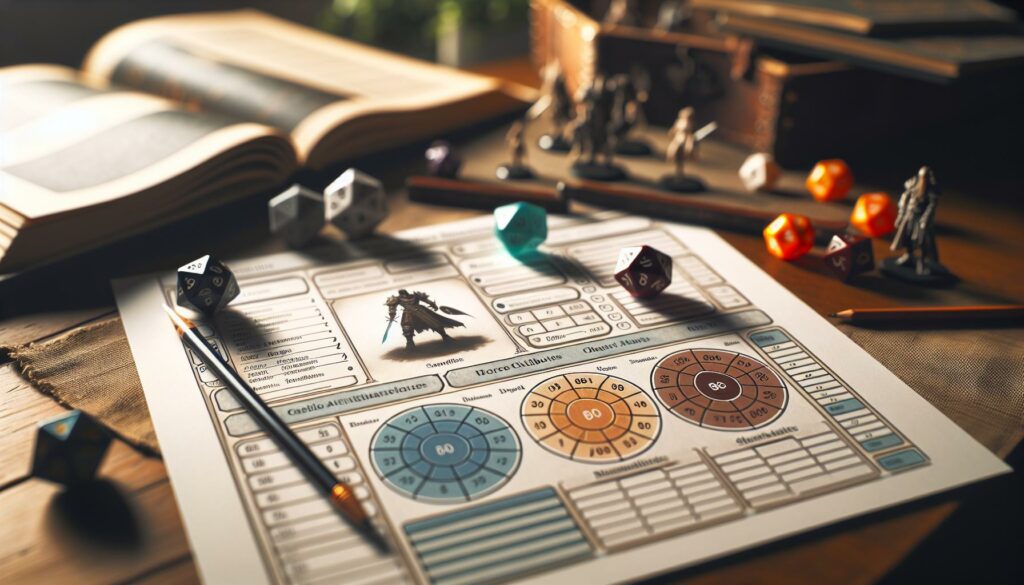I’ve spent countless hours designing and playtesting RPG character systems and I know how crucial a well-organized stats template can be. Whether you’re creating a tabletop game or developing a digital RPG the right template serves as your character’s backbone.
As a game designer I’ve learned that an effective RPG stats template needs to strike the perfect balance between complexity and usability. It should capture all essential character attributes while remaining intuitive for players to understand. Throughout my experience I’ve discovered that the best templates incorporate key elements like core attributes health points and specialized skills in a format that’s both comprehensive and accessible.
Key Takeaways
- A well-structured RPG stats template should balance complexity with usability, incorporating core attributes, health points, and specialized skills in an intuitive format
- Core attributes (like Strength, Dexterity, Constitution) typically range from 1-20 and form the foundation of character capabilities, while secondary stats are derived from these base values
- Essential elements of an RPG template include basic character information, combat statistics, and a comprehensive skill system that tracks both active and passive abilities
- Popular RPG systems like D&D 5E, World of Darkness, and GURPS offer different approaches to stat organization, from traditional ability scores to dot-based and point-buy systems
- Digital tools and templates, including character builder software and spreadsheet solutions, help automate calculations and streamline character management in modern RPG gaming
RPG Stats Template
Character stats form the quantitative foundation of any RPG system, providing numerical values that define a character’s capabilities. I structure these values into primary attributes and their resulting effects on gameplay mechanics.
Core Attributes and Ability Scores
RPG core attributes represent a character’s basic capabilities through numerical values, typically ranging from 1-20 in many systems. The standard set includes:
- Strength determines physical power for melee combat, carrying capacity
- Dexterity affects accuracy, reflexes, movement speed
- Constitution impacts health points, stamina, resistance
- Intelligence measures problem-solving, spell knowledge, skill points
- Wisdom reflects perception, willpower, survival instincts
- Charisma influences social interactions, leadership abilities
Derived Statistics and Secondary Values
Secondary stats emerge from combinations or calculations of core attributes, creating specialized performance metrics:
| Derived Stat | Base Calculation | Impact Range |
|---|---|---|
| Hit Points | Constitution × Level | 10-200 |
| Armor Class | 10 + Dexterity | 10-30 |
| Initiative | Dexterity + Level | 1-25 |
| Saving Throws | Attribute + Proficiency | 1-15 |
- Combat capabilities: attack bonus, damage resistance, critical hit chance
- Resource management: mana points, stamina regeneration, carrying capacity
- Skill effectiveness: crafting success rates, spell casting power, stealth modifiers
- Recovery factors: healing rates, rest duration, fatigue resistance
Essential Elements of an RPG Stats Template
An effective RPG stats template contains three fundamental categories that define a character’s capabilities in the game world. These elements work together to create a comprehensive character sheet that’s both functional and easy to navigate.
Basic Character Information
Basic character information forms the foundation of any RPG character sheet. I include fields for name age race class level background alignment in a prominent top section. Each character receives unique identifier codes experience points current status effects active conditions. Statistical tracking requires dedicated spaces for reputation faction standings character goals personal motivations.
Combat Statistics
Combat statistics encompass the numerical values that determine battle effectiveness. I organize these into clear sections:
- Attack Bonuses: Base attack modifier weapon proficiencies special attack types
- Defense Values: Armor class dodge rating damage reduction resistance levels
- Health Metrics: Maximum hit points current health temporary HP healing surge values
- Resource Pools: Action points stamina mana power points energy reserves
- Initiative Stats: Base speed reaction time combat order modifiers
- Core Skills: Trained abilities expertise levels skill ranks proficiency bonuses
- Special Powers: Unique abilities class features racial traits inherited powers
- Passive Abilities: Background traits innate capabilities automatic functions
- Equipment Effects: Gear-based bonuses magical enhancements technological upgrades
- Specializations: Advanced training focused expertise talent trees mastery paths
Popular RPG Stats Systems and Templates
RPG stats systems use distinct approaches to represent character abilities through numerical values. These templates vary in complexity from streamlined designs to intricate point-allocation systems.
D&D 5E Character Sheet Layout
D&D 5E’s character sheet template organizes stats into three core sections: ability scores, skills & proficiencies, and combat statistics. The six primary attributes (Strength, Dexterity, Constitution, Intelligence, Wisdom, Charisma) range from 3-18, with modifiers calculated on a scale of -5 to +5. The sheet includes:
- Character Info Box: Name, class, race, background, alignment
- Ability Score Grid: 6 core stats with modifiers
- Skills List: 18 skills linked to specific ability scores
- Combat Stats: AC, initiative, speed, hit points
- Equipment Tracker: Armor, weapons, items, currency
World of Darkness Attributes Format
World of Darkness employs a dot-based system with attributes ranked from 1 to 5 dots. The template divides characteristics into three categories:
- Physical Traits: Strength, Dexterity, Stamina
- Social Traits: Charisma, Manipulation, Appearance
- Mental Traits: Intelligence, Wits, Resolve
- Secondary Stats: Willpower, Health, Initiative
Each attribute dot represents increasing mastery:
| Dots | Meaning |
|---|---|
| • | Poor |
| •• | Average |
| ••• | Good |
| •••• | Exceptional |
| ••••• | Outstanding |
GURPS Point-Based System
GURPS (Generic Universal RolePlaying System) uses a flexible point-buy template where characters start with a pool of points. The system includes:
- Basic Attributes: Strength, Dexterity, Intelligence, Health
- Secondary Characteristics: Hit Points, Will, Perception, Fatigue
- Advantages/Disadvantages: Point costs range from -50 to +100
- Skills: Purchased separately with character points
| Attribute Level | Point Cost |
|---|---|
| Below Average | -10 points |
| Average | 0 points |
| Above Average | +10 points |
| Superior | +20 points |
| Exceptional | +50 points |
Creating a Custom RPG Stats Template
I design custom RPG stats templates by focusing on essential mechanics while maintaining user accessibility. This approach ensures players engage with the game system without getting overwhelmed by unnecessary complexity.
Balancing Complexity and Playability
I structure my custom templates using a three-tier stat system: primary attributes impact major game mechanics, secondary stats derive from primaries for specific actions, and tertiary stats handle specialized scenarios. Each primary attribute ranges from 1-10 to simplify calculations, while secondary stats use percentages or flat modifiers for quick reference. Here’s how I balance the stats:
| Stat Type | Range | Purpose | Example |
|---|---|---|---|
| Primary | 1-10 | Core mechanics | Strength, Agility |
| Secondary | +/-5 | Derived actions | Combat bonus, Save rolls |
| Tertiary | 0-100% | Specialized skills | Lockpicking, Stealth |
- Character Essentials
- Identity markers (name, race, class)
- Level progression metrics
- Experience tracking
- Combat Statistics
- Attack values
- Defense ratings
- Resource pools
- Initiative modifiers
- Skill Framework
- General abilities
- Specialized talents
- Professional skills
- Magic aptitudes
- Equipment Integration
- Weapon proficiencies
- Armor ratings
- Inventory capacity
- Magic item attunement
- Status Tracking
- Current conditions
- Temporary bonuses
- Active effects
- Recovery timers
Digital Tools and Templates
Digital tools revolutionize RPG stat management through automated calculations, dynamic updates, and easy customization options. These resources streamline character creation and maintenance while ensuring accuracy in stat tracking.
Character Builder Software
I’ve identified several powerful character builder applications that expedite the RPG character creation process:
- D&D Beyond integrates official 5E content with real-time stat calculations
- PCGen supports multiple game systems with customizable stat templates
- Hero Lab offers automated character progression tracking across 15+ RPG systems
- Roll20 provides built-in character sheets with integrated dice rolling functions
- Fantasy Grounds features dynamic stat updates during gameplay sessions
| Software Feature | Basic Version | Premium Version |
|---|---|---|
| Character Slots | 3-6 | Unlimited |
| Custom Content | Limited | Full Access |
| Stat Automation | Basic | Advanced |
| Export Options | PDF Only | Multiple Formats |
- Google Sheets templates with auto-calculating stat modifiers
- Excel workbooks featuring macro-enabled stat tracking systems
- Fillable PDF character sheets with form-saving capabilities
- OneNote templates organizing stats in customizable sections
- Notion databases with linked stat references
| Template Type | Features | File Size |
|---|---|---|
| Google Sheets | Auto-calc | 2-5 MB |
| Excel | Macros | 5-10 MB |
| PDF Forms | Fillable | 1-3 MB |
| OneNote | Sections | 3-7 MB |
| Notion | Database | Cloud-based |
Stats Template
Creating an effective RPG stats template is all about finding the perfect balance between functionality and user-friendliness. I’ve shown you how different systems approach this challenge and provided insights into crafting your own templates.
Whether you choose a traditional pen-and-paper approach or embrace digital tools I’m confident these guidelines will help you develop a stats system that enhances your gameplay experience. Remember that the best template is one that serves your specific needs while keeping players engaged and focused on the adventure ahead.
Now it’s your turn to take these insights and create a stats template that’ll bring your RPG characters to life. Happy gaming!



